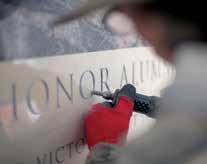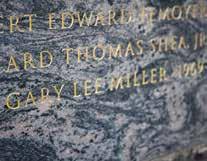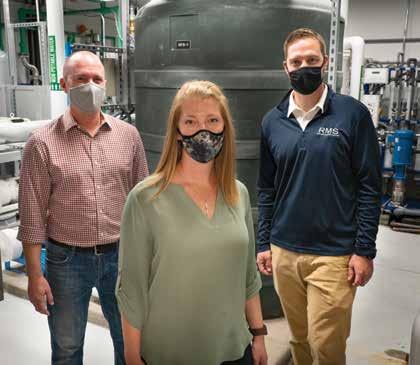
3 minute read
Retro


Advertisement
ETCHED INTO HISTORY: (above) On Veteran's Day 2017, a cadet stands in tribute at the Pylons. (right) More than a half-century after sacrificing his life in the ultimate act of service, Lt. Gary Lee Miller became the eighth Medal of Honor recipient whose name is etched onto the cenotaph.

MEDAL OF HONOR
THE WAR MEMORIAL PYLONS ARE one of the most iconic spots on Virginia Tech’s campus. The upper level contains Memorial Court with eight sculptured Indiana limestone pylons. The names of alumni who have died while in military service are carved on the pylons.
Centered at the back of Memorial Court is a marble cenotaph, which includes the names of alumni awarded the Medal of Honor.
Lt. Gary Lee Miller became the eighth Medal of Honor recipient whose name is etched onto the cenotaph. On Feb. 16, 1969, Miller, a unit commander in the U.S. Army, died after smothering an enemy grenade to save the men he was leading in South Vietnam.
A former resident of Covington, Virginia, Miller’s connection to Virginia Tech wasn’t immediately realized because he never attended the university in Blacksburg, but went to Clifton Forge-Covington Community College when it was designated as a branch of Virginia Tech. Protocol for inclusion on the cenotaph requires the Medal of Honor recipient to be an alumnus, whether or not they graduated. The connection between Miller and Virginia Tech was well known to Charlie Wood ’70, of Richmond, Virginia. Wood first began to inquire about adding Miller’s name in 2005. In 2018, he was able to connect with Miller’s younger brother, Michael Miller ’75.
Michael Miller said he was proud that his brother would now be remembered at the War Memorial alongside other Hokies who have laid down their lives in the service of the country.
For more details about Gary Lee Miller, visit vtmag.vt.edu. TW
Chris Quillen Shawn Crawford

Megan Repass Ellis
RAIN IS ESSENTIAL FOR GROWING food and many other functions critical to survival, but downpours can also erode our living spaces and create countless problems.
Three Hokies with degrees from three Virginia Tech colleges are teaming up to reinvent how we manage water flow.
Shawn Crawford ’11, ’13, who graduated with a bachelor’s degree in wood science and forest products and a master’s degree in forestry, returned home in 2014 to work as national sales manager for Rainwater Management Solutions. The Salembased business, founded 20 years ago by Crawford’s father, David Crawford, began by making rain barrels to collect and conserve rainwater. Through the vision of
JUST ADD WATER
the father-and-son team, the company continued to grow, designing more complex systems and creating opportunities for resolving further water-related challenges. In 2017, the Crawfords hired Chris Quillen ’98 as business development manager and added Megan Repass Ellis ’16 as inside sales manager. Quillen and Ellis joined a growing team that, through research and development, advanced the company’s services to encompass not only rainwater harvesting but graywater reuse and stormwater management. “Megan has an environmental science background and can read water quality analyses and understand what they’re saying,” Crawford said. “Once you make the step to become a bigger business, you need things that address human resources, marketing, and your website. Those were things Chris brought,” Crawford continued. Quillen, whose degree is in marketing management, originally joined the company as investor. He later took a position as a fulltime employee and was instrumental in helping organize the overall business. Together, the Hokie trio helped reinvent Rainwater Management Solutions’ approach to business by focusing on “just in time” production, a philosophy borrowed from Toyota.
Rather than carrying multiple products from different companies, Rainwater Management Solutions focused on standardized set-ups that provided solutions for its customers.
The systems sold by Rainwater Management Solutions make more efficient use of water, saving money for clients while also helping them to meet stormwater ordinances and reduce nonpoint pollution.
“The value that we add is for a company or business or even homeowners is to cut down on municipal water use,” said Quillen. “They’re using a more natural source of water coming from the sky instead of bringing it in from the local municipality. That helps stormwater control, because if you’re collecting water from a roof, it’s not running off.”
Rainwater Management Solutions contributed to water management at the Fralin Biomedical Research Institute at VTC—a smaller project than, say, its systems at the Virginia Capitol in Richmond, Virginia, or Allianz Field in St. Paul, Minnesota—but one that inspires pride in the Hokies. MA









